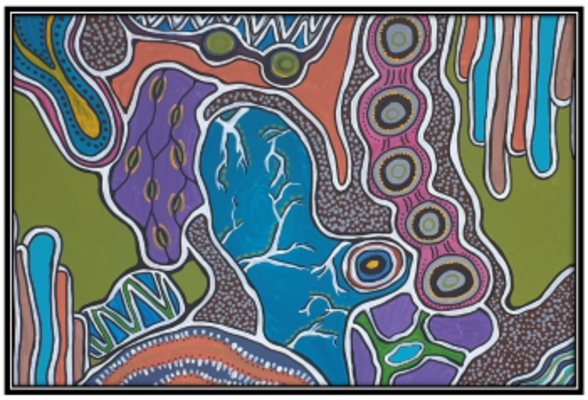Harmony Through Songlines

Original artwork 'Harmony Through Songlines' commissioned from First Nations artist Ailsa Walsh.
On 14 October 2023, a referendum will be held to recognise Aboriginal and Torres Strait Islander peoples in the Australian Constitution and to establish an Aboriginal and Torres Strait Islander Voice to Parliament.
The Queensland Mental Health Commission supports constitutional recognition of Aboriginal peoples and Torres Strait Islander peoples as the First Peoples of Australia, by enshrining a Voice in the Constitution.
Historically, there has been little acknowledgement of the negative effects of colonisation on Aboriginal and Torres Strait Islander peoples. This includes the ongoing impacts of trauma, racism and discrimination, that has accumulated across generations, and impacted on many aspects of First Nations peoples’ lives, including their mental health and wellbeing.
The Commission witnesses daily the impacts of the past on First Nations peoples. This is evidenced in high rates of mental health problems and suicide, and the impact of alcohol and other drug use. First Nations peoples must have a voice in addressing these and other issues in Australia, today and into the future.
A Voice to Parliament is a unique opportunity to promote equality and self-determination for First Nations peoples. The evidence shows us that better outcomes are achieved when Aboriginal and Torres Strait Islander people are involved in shaping and informing future decisions that impact their lives, families and communities. The Voice proposition is a simple one. It will provide a legislative framework to allow First Nations peoples to provide independent advice to government on the matters that affect them.
To move forward we need to recognise the past, understand the ongoing impact of trauma and collectively build a future that is compassionate and inclusive. The Commission believes that supporting the Voice to Parliament and Queensland’s Path to Treaty is essential to moving forward as a fair and just nation.
The time is right to build a future for all our children that recognises the past, but equally builds a nation that embraces First Nations peoples as integral to the fabric and future of our nation.
More information about the Voice
- Australian Government website on the Voice and the referendum: https://voice.gov.au/
- Uluru Statement from the Heart website: https://ulurustatement.org/design-principles/
- Australian Electoral Commission information on the referendum and how it will run: https://www.aec.gov.au/referendums/
- Australian Human Rights Commission Referendum Resource Kit: https://humanrights.gov.au/our-work/aboriginal-and-torres-strait-islander-social-justice/voice-referendum-understanding
Support Services
- 13YARN. For culturally safe First Nations crisis support, you can give 13YARN a call on 13 92 76. They offer a free, confidential one-on-one yarning opportunity with an Aboriginal and/or Torres Strait Islander Crisis Supporter, 24 hours a day, 7 days a week.
- Wellmob. Online social, emotional and cultural resources, developed by and for First Nations people, are available through Wellmob. This includes websites, apps, podcasts, videos, social media, and online counselling with a focus on social and emotional wellbeing. Explore the WellMob resources.
- AIMhi-Y. A mobile app to support the wellbeing of First Nations young people, aged 12-25, called AIMhi-Y. The app is a strengths-based, digital wellbeing tool that integrates education and brief intervention, embedding guidance from Elders, and building connection with culture, Country and language. The AIMhi-Y app is available for download on mobile devices via the App Store (Apple) or Google Play (Android).
- Lifeline. Lifeline offers support to Australians experiencing emotional distress with access to 24 hour crisis support and suicide prevention servies. Call 13 11 14.
- Suicide Call Back Service. The Suicide Call Back Service is a 24-hour national telephone crisis counselling and online service for people aged 18 years and over. Phone 1300 659 467.
Reporting racism
The true extent of racism in Australia is not well understood. If you experience racism, you may also want to report it. Doing so can inform evidence-based research that enables reporting on racism and its impacts, and strengthens anti-racism action.
- Call It Out is a secure, online register to report racism and discrimination experienced by First Nations people. Its purpose is to collect information on racism, including how it is experienced, how often it is occurring and the impact it is having on people. This data is hoped to progressively impact public policy into the future. Visit Call It Out to report an incident of racism.
- The Australian Human Rights Commission is an independent body that investigates complaints about human rights breaches, including discrimination on the basis of race, national or ethnic origin. It doesn’t cost anything to ask questions through the inquiry line or make a complaint, no matter where you live in Australia. The elements of the process, including how to make a complaint, are outlined on the Commission’s website.
- You may also be able to make a complaint to the Queensland Human Rights Commission.
